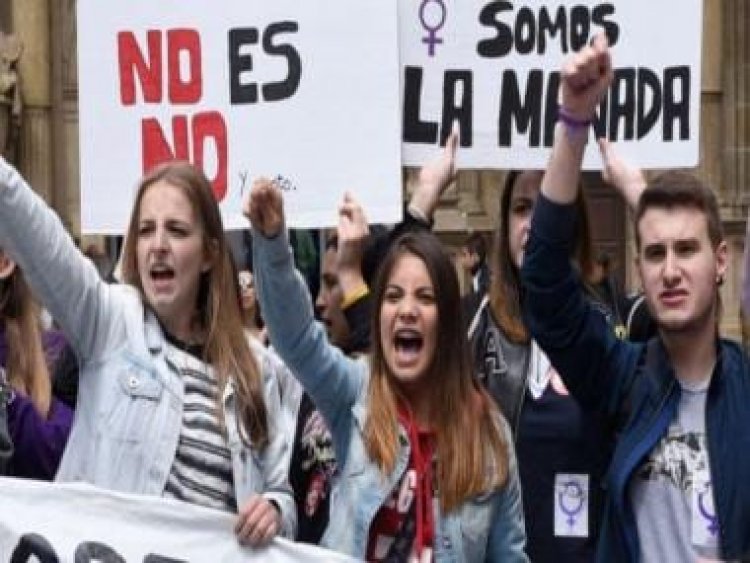‘Only yes means yes’: Spain’s historic law on sexual consent, explained
‘Only yes means yes’: Spain’s historic law on sexual consent, explained

In a landmark decision, Spain’s Parliament passed legislation that allows sexual violence victims to prosecute their attackers on the grounds of lack of consent.
The Guarantee of Sexual Freedom or ‘only yes means yes’ law, has been passed with 205 votes in favour, 141 against and 3 abstentions, reported The Guardian.
The reformed criminal code of Spain now defines rape as ‘sex without clear consent’, AFP reported.
Spain’s Equality Ministry, which has to be credited for the law on consent, has also been the force behind pushing the historic transgender rights bill and 16-week paternity leave.
Let’s talk in detail about the ‘only yes means yes’ law and the gangrape case that necessitated the legislation in Spain:
What is the ‘only yes means yes’ law?
Consent can no longer be assumed to have been granted by default or silence, states the new law in Spain.
‘Only yes means yes’ law erases the difference between abuse and assault.
Now, the victims will not be mandated to prove that they experienced violence or intimidation, or that they physically resisted, for their ordeal to be deemed as sexual assault.
“Consent can only be considered consent when it has been freely manifested through actions that, in accordance with the circumstances, clearly express the person’s wishes,” The Guardian cited the law as saying.
The law has also expanded the definition of sexual violence to include harassment in a public place where a person is subjected to unwanted “sexual or sexist expressions, behaviours or propositions”, BBC reported.
Whomever shares intimate images and videos of a person without their consent will also be fined under the new legislation.
Moreover, advertising promoting gender stereotyping or prostitution has been banned. The law says this has been done to “disincentivise the demand for all kinds of services linked to sexual exploitation, prostitution and pornography which normalises sexual violence”.
In the wake of the recent series of sexual assaults by minors, the law now requires young sex offenders to attend education programmes on sexual behaviour and equality.
‘Spain is a safer country for all women’
Calling it a “victorious day”, Equality Minister Irene Montero, who played a major role in creating the law, said that sexual freedom will finally be a right in Spain.

“We’re going to swap violence for freedom and we’re going to swap fear for desire. From today, Spain is a freer, safer country for all women,” Montero said.
“No woman will ever have to prove that violence or intimidation was involved in order for it to be considered a sexual assault,” she added.
Marisa Soleto, head of Fundacion Mujeres, told AFP that the law has been “long-awaited” demand of the feminist movement. “We’re hoping it will bring about a change in behaviour” both within Spain and beyond, she added.
The ‘only yes means yes’ law has been introduced amid a spurt in cases of sexual violence in Spain.
The country had reported 2,143 rapes in 2021, the highest known official figure.
Unhappy Opposition
The law brought on by the leftist coalition government of Pedro Sánchez has been opposed by the far-right Vox party and the conservative Popular Party (PP), which have called it unworkable.
Vox deputy Carla Toscano said that in many cases it is not possible for men to prove consent.
“When you force the system to believe a woman without proof, it creates a very dangerous weapon which any woman can use to take revenge on or destroy the life of an innocent person with lies,” Toscano was quoted as saying by BBC.
What prompted the ‘only yes means yes’ law?
The notorious Manada or “wolf-pack” case that created uproar in Spain has led to the creation of the law on consent.
In 2016, five men had raped an 18-year-old girl in Pamplona during the famous Running of the Bulls festival. The men were found guilty of a lesser sexual abuse charge and granted nine-year jail sentences.
The court refused to convict them for rape saying neither violence nor intimidation was used.
The assault was filmed by two men which showed the woman was silent and passive — which was presumed by judges as consent.
Consent emerged as the major issue in the case as the defendants’ legal team argued that the victim did not say “no”, which she said was due to being ‘paralysed by fear’, as per BBC.
Following the verdict, Spain witnessed a huge backlash on social media and several people took to the streets to register their protest.
The Supreme Court overturned the verdict in 2019 and charged all five accused of rape and increased their sentences from nine to 15 years each.
After he took office in June 2018, Socialist prime minister Pedro Sánchez, who identifies as a feminist, had promised to bring a law on consent in order to remove the ambiguity in rape cases.
As per Amnesty International, besides Spain, seven other European countries have initiated consent-based rape legislation since 2018: Denmark, Croatia, Greece, Malta, Sweden, Iceland and Slovenia.
With inputs from agencies
Read all the Latest News, Trending News, Cricket News, Bollywood News,
India News and Entertainment News here. Follow us on Facebook, Twitter and Instagram.
What's Your Reaction?


























































